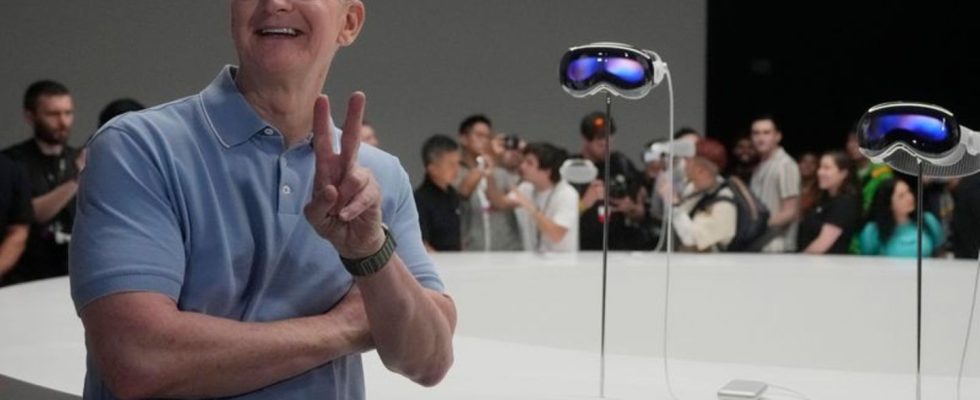technologies
Apple boss Cook bets on the future with computer glasses
Apple CEO Tim Cook poses next to the new Vision Pro headsets at the company’s Cupertino campus. photo
© Jeff Chiu/AP/dpa
Tim Cook is considered an experienced top manager who has screwed Apple’s profits to dizzying heights over the years. Now he wants to prove that he can also bring successful innovations onto the market.
Apple boss Tim Cook has been leading the iPhone group for almost twelve years and has since increased the company’s value tenfold. Despite the enormous economic success, however, critical voices do not fall silent. Critics point out that almost all current successful products with the apple logo can still be traced back to the visions of Steve Jobs, who died in October 2011 as a result of cancer. With a new pair of computer glasses, Cook now dares to emerge from the shadow of the legendary company co-founder.
At the Apple developer fair WWDC on Monday (local time), Cook presented his first data glasses called Vision Pro to the public, with which Apple wants to establish nothing less than a new computer platform. On the one hand, the Vision Pro allows users to immerse themselves in virtual reality like conventional VR glasses, but at the same time allows them to perceive the analogue environment again and again.
Switch between worlds
The headset, which looks like futuristic ski goggles, offers users a three-dimensional user interface. With this, you can see your analogue environment and virtual reality at the same time or switch between both worlds.
Apple calls the Vision Pro a portable environmental computer. “We believe that the Apple Vision Pro is a revolutionary product,” said CEO Cook. He was convinced that the device would change the way people communicate and work together. In the United States, the device will be launched early next year. A date for the market launch outside the USA has not yet been announced.
With the Apple glasses, the environment is captured by cameras on the housing and reproduced on displays in front of the user’s eyes. The competition also follows this principle. The glasses have 23 million pixels spread over both screens – more than the 4K resolution of a TV for each eye.
Apple sees a possible use for the Vision Pro at work because you can display many large virtual displays in your field of vision. However, the Apple glasses should also be able to be used like a mobile 3D cinema and for other entertainment applications. The Disney+ streaming service will be available on the Vision Pro right from the start.
Mass market idea?
Carolina Milanesi, an analyst at market research firm Creative Strategies, said in Cupertino that she doesn’t think the headset is currently intended for the mass market. Instead, Apple is initially targeting technology enthusiasts and developers who will program applications for the Vision Pro. “For this demographic, even the $3,500 that Apple wants for the first generation isn’t a problem. They want the latest and the best. The price tag doesn’t matter much.”
However, the expert assumes that the comparatively high price will not stop there. Even the name “Vision Pro” could be an indication that there could be a cheaper, perhaps less powerful device in the foreseeable future, a “Vision without a Pro,” Milanesi told the dpa news agency.
Apple is entering the market with its high-priced product at a moment when the short-lived hype surrounding the business with virtual worlds and objects has noticeably died down. Instead, thanks to the text robot ChatGPT, which can formulate sentences at the linguistic level of a human being, artificial intelligence is the focus.
A niche business so far
Facebook founder Mark Zuckerberg in particular continues to believe in a future in which large parts of life will take place in a digital world – the “Metaverse”. To emphasize this, he renamed the Facebook group “Meta”. But despite billions in investments, VR glasses and virtual worlds have so far remained a niche business – which brings Meta billions in losses. The group is the market leader in VR headsets and welcomed Apple last week by announcing the new Meta Quest 3 model at a price of 570 euros. It will also be good at overlaying digital objects into the real environment, Zuckerberg said.
The business with VR glasses has so far been incomparably smaller than the smartphone market. Market researchers at IDC assume that only ten million VR and AR headsets will be sold in 2023. For comparison: Last year, more than 1.2 billion smartphones were sold worldwide.
At the beginning of the event, new Mac computers with more powerful processors were presented. Among them is the first model of the Mac Pro, aimed at professional users, with in-house chips. This completes the multi-year conversion of the model range from Intel processors to chips developed in-house. Then innovations of the next operating systems for iPhone, iPad and Mac were presented. This includes, among other things, the possibility of exchanging contact data more easily between two iPhones.

